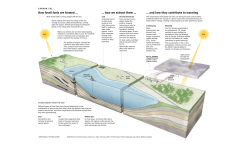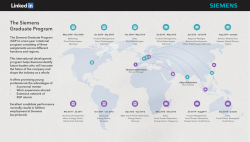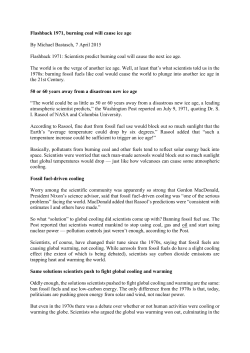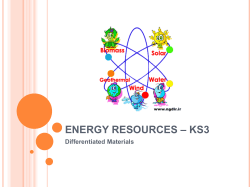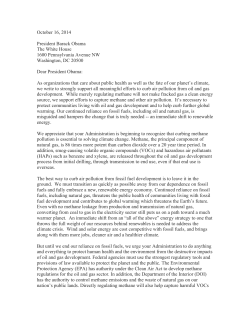
Are we running out of fossil fuels? - Sustainable Energy
Are we running out of fossil fuels? Sustainable Energy Prof. P. Dewallef ULg - Applied Sciences March 24, 2015 Prof. P. Dewallef (ULg - Applied Sciences) Are we running out of fossil fuels? March 24, 2015 1 / 25 Introduction What is a fossil fuel ? Definition Naturally occurring fossil fuels are solid, liquid or gaseous substances that contain organic (or covalently bonded) carbon and are produced by chemical and physical transformations of plant and animal remains over geological time periods. The chemical energy contained in fossil fuels is traditionally extracted by a rapid reaction with an oxidant through a process called combustion (to distinguish combustion from the electrochemical oxidation where the fuel produce electricity and heat in fuel cells). CH4 + 2O2 → CO2 + 2H2 O + heat Prof. P. Dewallef (ULg - Applied Sciences) Are we running out of fossil fuels? March 24, 2015 2 / 25 Introduction Different types of fossil fuels Coal : Sometimes referred as organic rock, coal originates from the arrested decay of the remains of plant life that flourished in humid areas many millions of years ago. Coal is not a uniform substance and contains variable amount of inorganic materials (e.g., sulfur and nitrogen). Petroleum : Literally rock oil, it consists of a complex mixture of hydrocarbons, sulfur, nitrogen and sometimes oxygen. Natural Gas : Found in underground reservoirs of porous rocks (sometimes mixed with petroleum), it consists primarily of methane (CH4 ). Shale Gas : Natural gas can also be found in shale deposits. The low shale permeability makes the extraction of the gas more difficult yet recent advances in horizontal drilling and hydraulic fracturing have led to significant increase of the production rates. Oil Shale : A fine-grained sedimentary rock consisting mainly of carbon and hydrogen and capable of producing petroleum-like liquids upon heating. Tar Sands : a sand impregnated of a viscous hydrocarbon substance (up to 18%) known as bitumen. Prof. P. Dewallef (ULg - Applied Sciences) Are we running out of fossil fuels? March 24, 2015 3 / 25 Introduction Why fossil fuels are so attractive ? In 2010, 85% of the developed world’s energy was supplied by fossil fuels. Fossil fuels have gained this position because of the attractive cost but also for its convenience for the consumers. Several facts : During fueling of a motor with gazoline, energy flows at a rate of 5-10MW (equivalent to supplying 5000-10000 persons). The cost to replace the global infrastructure for liquid transportation fuels is estimated to $3-5 trillion. Designing, testing and validation of new concepts requires 2 to 10 years and permitting, constructing and commissioning a new commercial facility needs 10 years. While changing the energy sector from fossil fuel to something else is possible, the time needed to make the change makes it difficult to switch rapidly. Prof. P. Dewallef (ULg - Applied Sciences) Are we running out of fossil fuels? March 24, 2015 4 / 25 Fossil fuels : the resource Estimating the reserve The world coal reserve is estimated at 290 000 000 PJ while the consumption rate in 2010 was 490 000 PJ. If the world switched all its energy consumption to coal the reserve would last 290 × 106 /490 × 103 = 592years at actual consumption. If the consumption is growing at a rate m, what would be the remaining time ? dQ = ce mt . Taking the year 1995 as the origin leads Assuming exponential growth, we have : dt to : dQ dQ dQ 0 = ce = c → e mt = dt dt dt t=1995 t=1995 Integrating between the current time and the depletion time yields : Z Q∞ Z ∆t i dQ dQ 1 h m∆t mt dQ = e dt = e − 1 dt t=1995 0 dt t=1995 m Q1995 Q∞ −Q1995 ln m dQ +1 dt |t=1995 After some algebraic steps, we obtain ∆t = . Taking m = 2% leads to m ∆t = 192 years. Prof. P. Dewallef (ULg - Applied Sciences) Are we running out of fossil fuels? March 24, 2015 5 / 25 Fossil fuels : the resource Conventional approach to fossil fuel depletion One possible approach is to consider that, as fossil fuels are exhaustible, they exist in the Earth in a fixed stock. → When this stock is used up, it becomes harder to recover whatever fuel from the resource. → the recovery cost and the resulting price to consumers will increase. The conclusions of that reasoning is that the time of cheap oil is finished as oil production has already peaked or will be very soon peaked. Conventional depletion arguments express the temporal history of mineral-fuel production in terms of Hubbert curves. Prof. P. Dewallef (ULg - Applied Sciences) Figure : The Hubbert curve for US crude oil production. The actual production is well above the one predicted by the Hubbert curve. Are we running out of fossil fuels? March 24, 2015 6 / 25 Fossil fuels : the resource The Hubbert curve Figure : Two production curves estimated from production data. Prof. P. Dewallef (ULg - Applied Sciences) Are we running out of fossil fuels? March 24, 2015 7 / 25 Fossil fuels : the resource Non-conventional approach to fossil fuel depletion However, nobody knows when the world will run out of oil or any other fossil fuel. Indeed, for a single reservoir, geologists can assess the amount of petroleum available but the petroleum reserves exist in many dispersed regions differing widely in size, quality and production costs. The classical view of depletion theory does not account for advances in technology that will enable the profitable exploitation of stocks of fuels that previously were unknown or judged unattractive to develop. The history of our knowledge of fossil resources to date favors the latter thinking. the last 75 years, the recorded world’s petroleum reserves are growing, not declining and the prices (corrected for inflation and taxes) are stable or declining. Energy price fluctuation are better explained by political and economic crises than available resources. Prof. P. Dewallef (ULg - Applied Sciences) Are we running out of fossil fuels? March 24, 2015 8 / 25 Fossil fuels : the resource How long will fossil fuels last ? If the incremental cost of production from a given source exceeds the cost of other wells or mines producing fossil fuels the production of that source is suspended. So far, the technology has won the battle for fossil fuel production... Figure : World production and cumulative reserves of fossil fuels in bbl (1944-2010). Prof. P. Dewallef (ULg - Applied Sciences) Are we running out of fossil fuels? March 24, 2015 9 / 25 Fossil fuels : the resource Oil resource per category Figure : Oil resources an reserve in 2013 (source IEA) expressed in bbl. Prof. P. Dewallef (ULg - Applied Sciences) Are we running out of fossil fuels? March 24, 2015 10 / 25 Fossil fuels : the resource Gas resource per category Figure : Gas resources an reserve in 2013 (source IEA) expressed in tcm (1 tcm ' 6 bbl). Prof. P. Dewallef (ULg - Applied Sciences) Are we running out of fossil fuels? March 24, 2015 11 / 25 Fossil fuels : the resource Available resource duration Prof. P. Dewallef (ULg - Applied Sciences) Are we running out of fossil fuels? March 24, 2015 12 / 25 Sustainibility aspects Primary energy prices Figure : Energy prices evolution from 1900 to 1996 (without taxes). Prof. P. Dewallef (ULg - Applied Sciences) Are we running out of fossil fuels? March 24, 2015 13 / 25 The role of non-conventional fossil fuels Importance of non-conventional fossil fuels Gas is a relatively clean (high hydrogen content) and flexible fuel (used in gas turbines) that make it an ideal complement to renewable energies BUT : Half of the gas consumed in Europe comes from Russia and is still sold on prices indexed on oil price (makes gas more expensive). The gas is losing shares with respect to coal (cheaper). In countries with high renewable share, the average utilization of gas-fired plant has dropped significantly. In order for the EU to develop policies some questions need to be addressed : 1 Will fracking be environmentally unsafe and environmentally disruptive ? 2 Will shale gas be as cheap as in the US ? Prof. P. Dewallef (ULg - Applied Sciences) Are we running out of fossil fuels? March 24, 2015 14 / 25 The role of non-conventional fossil fuels Shale gas extraction technique The gas and oil containing shales are classified as shales on the basis of the very fine particles that make up the rock. Prof. P. Dewallef (ULg - Applied Sciences) Are we running out of fossil fuels? March 24, 2015 15 / 25 The role of non-conventional fossil fuels Shale gas well operation stages Prof. P. Dewallef (ULg - Applied Sciences) Are we running out of fossil fuels? March 24, 2015 16 / 25 The role of non-conventional fossil fuels Methane contamination in fresh water wells Natural source of methane are decaying or digesting vegetation that can come in contact with groundwater and methane gas adsorbed onto the organic shallow coal surface that can access ground water. If water is withdrawn from the well at a rate above the recharge rate, the methane will be absorbed by the well. The later cause of contamination could be a default in the cement isolation or channel leakage (as for the frac fluid). Prof. P. Dewallef (ULg - Applied Sciences) Are we running out of fossil fuels? March 24, 2015 17 / 25 The role of non-conventional fossil fuels Resource of shale gas Country China United States Argentina Mexico South Africa Australia Canada Libya Algeria Brazil Poland France Total Prof. P. Dewallef (ULg - Applied Sciences) Are we running out of fossil fuels? Technically Recoverable Shale Gas Resources 36.1 × 1012 m3 24.4 × 1012 m3 21.9 × 1012 m3 19.3 × 1012 m3 13.7 × 1012 m3 11.2 × 1012 m3 11.0 × 1012 m3 8.2 × 1012 m3 6.5 × 1012 m3 6.4 × 1012 m3 5.3 × 1012 m3 5.1 × 1012 m3 158 × 1012 m3 March 24, 2015 18 / 25 The role of non-conventional fossil fuels Oil and natural gas major net importers Figure : The new geography of demand and supply means a re-ordering of global energy trade towards Asia Prof. P. Dewallef (ULg - Applied Sciences) Are we running out of fossil fuels? March 24, 2015 19 / 25 The role of non-conventional fossil fuels Influence of shale gas on energy prices Figure : Ratio of industrial energy prices relative to the United States Prof. P. Dewallef (ULg - Applied Sciences) Are we running out of fossil fuels? March 24, 2015 20 / 25 The role of non-conventional fossil fuels Could Europe simply import the cost advantage of cheeper US gas ? Figure : Indicative economics of LNG export from the US Gulf Coast (at current prices). High costs of transport between regions mean no single global gas price. Prof. P. Dewallef (ULg - Applied Sciences) Are we running out of fossil fuels? March 24, 2015 21 / 25 The role of non-conventional fossil fuels Energy prices in the industry Figure : Share of energy in total production costs for selected industries. Prof. P. Dewallef (ULg - Applied Sciences) Are we running out of fossil fuels? March 24, 2015 22 / 25 The role of non-conventional fossil fuels Energy prices and economic growth Figure : Share of global export market for energy-intensive goods. Prof. P. Dewallef (ULg - Applied Sciences) Are we running out of fossil fuels? March 24, 2015 23 / 25 The role of non-conventional fossil fuels Energy policies critical for Europe’s future ! Stronger action to improve energy efficiency must be central to reconciling energy security, competitiveness and climate goals Supporting indigenous sources of energy supply, including renewables, nuclear power and unconventional gas can also help Renegotiation of long-term gas import contracts involving a shift away from oil indexation to hub-based pricing could also cut costs Prof. P. Dewallef (ULg - Applied Sciences) Are we running out of fossil fuels? March 24, 2015 24 / 25 The role of non-conventional fossil fuels Fossil resource and sustainability As it is mentioned above, the driving force for sustainability is not that the world is running out of fossil fuels and needs to seek for alternative energy sources. The energy supply from fossil fuels seems guaranteed for the several decades to come. However, alternatives energy sources do need to be developed for any of the following reasons : In case higher levels of global warming predicted from a doubling of current atmospheric concentrations of CO2 prove to be correct. As a way to diversify our energy sources and avoid over reliance on any one source (would it become unavailable for political, environmental, regulatory or technological factors). In this frame, fossil fuels are able to supply energy as a transition to non fossil alternatives at a pace that will prevent economic disaster. Prof. P. Dewallef (ULg - Applied Sciences) Are we running out of fossil fuels? March 24, 2015 25 / 25
© Copyright 2025

